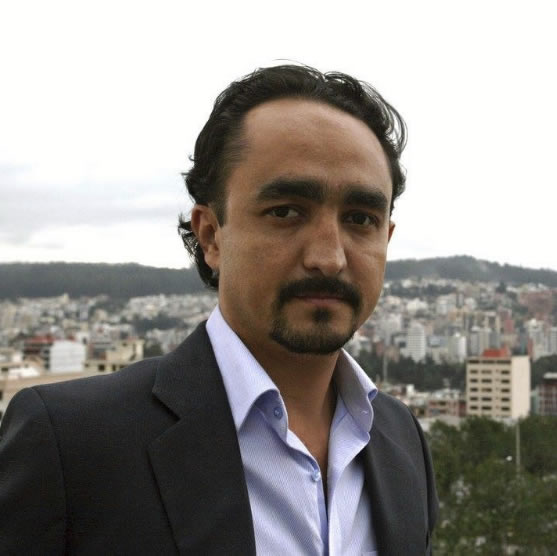César Eduardo Carrión (1976) is a prolific writer with a diverse literary repertoire. Holding a doctoral degree in Latin American Literature from the Universidad Andina Simón Bolívar, he is currently a professor at the Pontifical Catholic University of Ecuador. César has established himself as a respected figure in the Ecuadorian literary landscape, with a notable list of published works. His poetry books include “Revés de luz” (2006), “Pirografías” (2008), “Limalla babélica” (2009), “Poemas en una Jaula de Faraday” (2010), “Cinco maneras de armar un travesti” (2011), “Emboscada” (2017), “Es lodo y es polvo y es humo y es nada” (2018), and “Emboscada / Ambush” (translated by Kimrey Anna Batts, 2019). Additionally, César has contributed to the field of essays with several works, delving into various topics. Through his literary contributions and academic expertise, César Eduardo Carrión has made a significant impact on Ecuadorian literature.
César Eduardo Carrión: Prolific Writer and Influential Scholar in Ecuadorian Literature
Introduction
César Eduardo Carrión, born in 1976 in Quito, Ecuador, is a highly regarded writer, poet, and professor. Carrión’s academic background, combined with his literary achievements, has positioned him as a respected figure in Ecuadorian literature. His expertise and knowledge have influenced aspiring writers and scholars, contributing to the growth and development of literature in Ecuador.
Academic Background and Career
Doctoral Degree in Latin American Literature
César Eduardo Carrión earned his doctoral degree from the prestigious Universidad Andina Simón Bolívar (2012-2017) specializing in Latin American Literature. He conducted his doctoral research and defended his thesis titled “La novela ecuatoriana del siglo XIX como relato del surgimiento de la nación (1855-1893)” (The Ecuadorian Novel of the 19th Century as a Narrative of the Emergence of the Nation). The thesis was supervised by Professor Vicente Robalino from the Pontifical Catholic University of Ecuador. The defense of his doctoral thesis took place at the Universidad Andina Simón Bolívar, with a tribunal composed of renowned scholars including Doris Sommer from Harvard University, and Leonardo Valencia and Fernando Balseca from the Universidad Andina Simón Bolívar, Sede Ecuador. This accomplishment showcases Carrión’s dedication to research and his expertise in analyzing and interpreting Ecuadorian literature of the 19th century.
Professorship at the Pontifical Catholic University of Ecuador
Currently, Carrión serves as a professor at the renowned Pontifical Catholic University of Ecuador (PUCE). His role allows him to impart his knowledge and passion for literature to aspiring students, contributing to the academic development of future scholars.
Administrative Roles
In addition to his teaching responsibilities, Carrión has held various administrative positions. He has served as the Director of the School of Language and Literature, the Center for Publications, and as the Dean of the Faculty of Communication, Linguistics, and Literature. These positions highlight his leadership and organizational skills within the academic sphere.
Notable Poetry Collections
“Revés de luz” (2006)
Carrión’s debut poetry collection, “Revés de luz,” garnered recognition by receiving a Mención de Honor in the 2007 Jorge Carrera Andrade contest organized by the Municipality of Quito. This early work established Carrión as a poet of great promise.
“Pirografías” (2008)
Another significant contribution to the poetic landscape, “Pirografías,” was a finalist for the III Premio Internacional de Poesía Joven “La Garúa.” This recognition further solidified Carrión’s reputation as a talented poet.
“Emboscada / Ambush” (2017) and English Translation
“Emboscada / Ambush” (2019) stands out as one of Carrión’s notable works. This bilingual poetry volume, with an English translation by Kimrey Anna Batts, represents Carrión’s first full-length collection translated into English. The collaboration between Carrión and Batts ensures that the sense and rhythm of each poem are effectively conveyed to English-speaking readers. The translation expands the reach of Carrión’s poetic voice, introducing his work to a broader international audience.
Exploration of Diverse Themes
Carrión’s subsequent poetry works, including “Limalla babélica” (2009), “Poemas en una Jaula de Faraday” (2010), and “Cinco maneras de armar un travesti” (2011), showcase his lyrical style and delve into a wide range of themes. Through his poetry, Carrión explores emotions, social issues, and personal experiences, captivating readers with his evocative language and imagery.
Impact on Ecuadorian Literature
Recognition and Awards
César Eduardo Carrión’s poetic talent and literary contributions have garnered recognition and accolades within the Ecuadorian literary community. His works have received notable awards, including the Mención de Honor (Honor Mention) in the 2007 Jorge Carrera Andrade contest organized by the Municipality of Quito for his poetry collection “Revés de luz” (2006). Additionally, Carrión achieved recognition as a finalist in the III Premio Internacional de Poesía Joven “La Garúa” (International Young Poetry Award “La Garúa”) for his poetry collection “Pirografías” (2008).
Works
Poetry Books:
- Revés de luz (2006)
- Pirografías (2008)
- Limalla babélica (2009)
- Poemas en una Jaula de Faraday (2010)
- Cinco maneras de armar un travesti (2011)
- Emboscada (2017)
- Es lodo y es polvo y es humo y es nada (2018)
- Emboscada / Ambush (translated by Kimrey Anna Batts, 2019)
Nonfiction/Essays Books:
- La diminuta flecha envenenada: en torno de la poesía hermética de César Dávila Andrade (2007)
- La diminuta flecha envenenada: en torno de la poesía hermética de César Dávila Andrade (second edition, 2019)
- Habitada ausencia: Historia y poética en la poesía de Javier Ponce (2008)
- El deseo es una pregunta. Ensayos sobre poesía latinoamericana (2018)
- Las máscaras de la patria. La novela ecuatoriana como relato del surgimiento de la nación (1855-1893) (2020)

